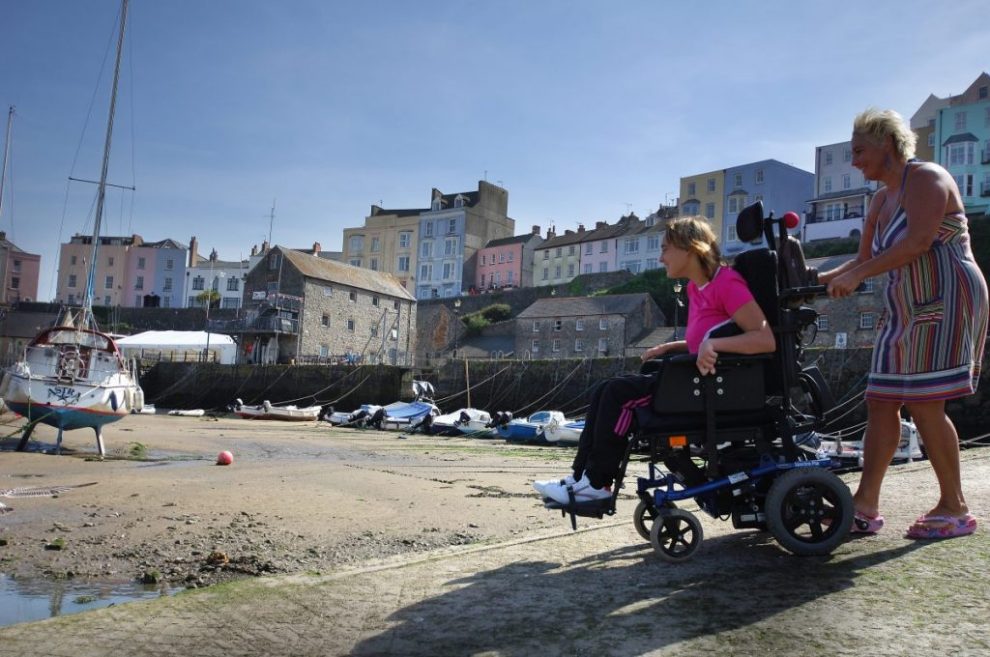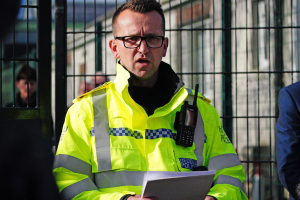INADEQUATE infrastructure is unfairly discriminating against disabled people when they move around their neighbourhood with inaccessible routes leading to journeys cut short, and isolation.
These are the findings of a report released on Wednesday (Feb 8) by Sustrans, the UK’s largest walking and cycling charity, which reveals the grim reality of a lack of dialogue with disabled people on their ability to access their community and make essential daily journeys.
The charity is calling on local and national governments to give disabled people a voice when it comes to decisions that affect how they get around their local area.
Xavier Brice, CEO of Sustrans, said: “Our report clearly demonstrates that understanding the barriers disabled people experience getting around their neighbourhoods is imperative in creating an equitable society.
“Putting disabled people at the centre of discussions about how we plan and create spaces where we can all move around easily and safely is vital. The UK Government must listen and take action to create places planned around people, not cars.”
The report is the culmination of a six-month long Disabled Citizens Inquiry, coordinated by the charity in partnership with Transport for All, a disabled persons organisation.
An accompanying Ipsos survey of over 1,100 disabled people across the UK paints a stark picture of how inaccessible and dangerous our neighbourhoods and communities have become.
41% of all disabled people said they often experience barriers, reaching their destination on a typical walking or wheeling journey, such as level kerbs to cross the street or clutter on the pavement. This increased to 55% for those with mobility impairments or learning disabilities.
Coordinating the findings, Sustrans has released recommendations that aim to make communities and neighbourhoods safer, accessible, and more inclusive for disabled people.
These include:
- Prohibiting pavement parking to make communities more accessible
- Creation of a long-term dedicated pavement fund to improve and maintain pavements
- Ensuring disabled people can be within walking or wheeling distance of services and amenities by creating communities with accessible services close to where people live through better planning
In the Inquiry survey provided by Ipsos, almost 4 in 5 disabled people (79%) said a national Pavement Fund, to maintain and improve pavements, would be useful in helping them walk or wheel more in their local area.
In addition to a dedicated pavement fund, Sustrans continues to call on the UK Government to ban pavement parking, with 73% of disabled people surveyed saying this would help them to walk or wheel more.
Mark, a workshop participant from Swansea, said: “People notice my guide dog Bobby much more than they did my cane. They used to trip over it and take it out on me as if it was my fault. Bobby’s very reassuring. Hopefully I’ll never have to go back to a cane.
“Pavement parking is a real problem because I’ve got to go on the road. And Bobby can’t tell me if there’s any cars coming. On a 200-yard walk, this could happen maybe four or five times.
“Not all pelican crossings bleep when the light turns green, but the button unit should have a small cone underneath which you can feel spinning when it’s time to cross. Quite a few cones in my area don’t work, so I can’t cross unless somebody else is there at the same time. This can mean I need to get on a bus, just to get off on the other side of the road once it’s on its return journey. This could take half an hour extra.”
Here in Wales, Sustrans is calling for stronger action from Welsh Government to support the ban of pavement parking. The findings of the Inquiry reinforce the need and urgency for stronger enforcement of the pavement parking ban, and underline the importance of listening to the lived experiences of disabled people.
Christine Boston, Director of Sustrans Cymru, said: “The report includes evidence from disabled people here in Wales, and shows that the challenges disabled people experience in moving around are equally as stark as elsewhere in the UK. There are many barriers to independent mobility caused by issues like pavement parking, pavement clutter, and poorly maintained pavements.
“We welcome Welsh Government bringing forward legislation to tackle pavement parking. As a first step, it is important that this happens soon and with as few exceptions as possible. More again must be done to make our towns and cities accessible and inclusive places that everyone can live, work, and move around in.”
The Inquiry has shown that the cost of living crisis is having a direct impact on how often disabled people travel; 59% have reduced their travel overall and 52% agree rising costs are affecting essential journeys such as shopping, accessing healthcare services, and attending education and work.
A planning system that ensures people live within walking or wheeling distance of basic services they need would be useful in helping 88% of disabled people walk or wheel more in the local area, according to the UK wide survey. Disabled people are less likely to own a car and public transport does not exist in many areas, so ensuring new homes are built near services is vital.
And with this comes a boost to the UK economy with benefits in the region of £72.4 billion per annum, including for local businesses, if the ‘transport accessibility gap’ of 38% fewer journeys[1] by disabled people is addressed.
The Disabled Citizens Inquiry initiative has been conducted in partnership with transport charity Transport for All, and was funded by the charity Motability.
Caroline Stickland, CEO of Transport for All, said: “Transport for All’s role was to ensure that disabled peoples’ voices were at the heart of this ground-breaking inquiry. From codesigning the study, to facilitating pan-impairment workshops, to generating recommendations, disabled people were involved at every stage.
“Not only does this give the government a uniquely clear and actionable picture of what we as disabled people need to make walking and wheeling more accessible, it provides a blueprint for how our community must be engaged with for every mode of transport going forward.”
Rachael Badger, Director of Performance and Engagement at Motability said: “This inquiry provides eye opening insight into the experiences of disabled people and the challenges they face when moving around their communities. It is vital that the voices of disabled people are heard when decisions are taken about infrastructure in their local areas, and that accessibility is made a priority. We are pleased to have supported this important research.”


















